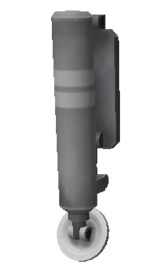Difference between revisions of "LT-1 Landing Struts"
From Kerbal Space Program Wiki
m (added poodle section) |
UmbralRaptor (talk | contribs) (Just did some testing, it looks like even with LT-1 legs placed all the way down, they can't quite get clearance. It's close, though.) |
||
| Line 7: | Line 7: | ||
The LT-1 is connected radially and extends with the G key (Default). It does not extend as far as the larger [[LT-2 Landing Strut]], but is just half as heavy. | The LT-1 is connected radially and extends with the G key (Default). It does not extend as far as the larger [[LT-2 Landing Strut]], but is just half as heavy. | ||
| − | As they are relatively short, LT-1 landing struts need to be placed low on a rocket. They do not extend far enough to be used with [[LV-T30 Liquid Fuel Engine|LV-T30]] | + | As they are relatively short, LT-1 landing struts need to be placed low on a rocket. They do not extend far enough to be used with [[LV-T30 Liquid Fuel Engine|LV-T30]], [[LV-T45 Liquid Fuel Engine]]s or even the [[Rockomax "Poodle" Liquid Engine|Poodle]], but can reach past the [[LV-909 Liquid Fuel Engine|LV-909]] and [[Toroidal Aerospike Rocket|Aerospike]]. |
The maximum safe landing speed for an LT-1 landing strut is ~12 m/s. Landings with massive rockets or on rough terrain may need to be slower to avoid ripping off landing legs. | The maximum safe landing speed for an LT-1 landing strut is ~12 m/s. Landings with massive rockets or on rough terrain may need to be slower to avoid ripping off landing legs. | ||
Revision as of 07:08, 30 November 2014
| LT-1 Landing Struts | ||
| Landing leg by Moving Parts Experts Group | ||
| Radial size | Radial mounted | |
| Cost | (total) | 440.00 |
| Mass | (total) | 0.050 t |
| Drag | 0.2 | |
| Max. Temp. | 2000 K | |
| Impact Tolerance | 12 m/s | |
| Research | | |
| Unlock cost | 2 900 | |
| Since version | 0.16 | |
| Part configuration | landingLegLT-1.cfg | |
| Retractable | Yes | |
| Brake torque | No | |
| Steering range | No | |
| Packed volume | 160 l | |
The LT-1 Landing Strut is used as a landing support when landing vertically.
Usage
The LT-1 is connected radially and extends with the G key (Default). It does not extend as far as the larger LT-2 Landing Strut, but is just half as heavy.
As they are relatively short, LT-1 landing struts need to be placed low on a rocket. They do not extend far enough to be used with LV-T30, LV-T45 Liquid Fuel Engines or even the Poodle, but can reach past the LV-909 and Aerospike.
The maximum safe landing speed for an LT-1 landing strut is ~12 m/s. Landings with massive rockets or on rough terrain may need to be slower to avoid ripping off landing legs.
Product description
| “ | It may have been originally designed as a heavy-duty metal detector, but this Landing Leg certainly emphasises[sic] an important fact in surface landings: You don't need to put a crater in the ground to stop yourself. | ” |
Changes
- Revamped (new model), new deployment animation and Suspension
- Name corrected (LT-2 → LT-1), mass increased from 0.005 to 0.05.
- part file/internal behavior changed.
- Initial release

